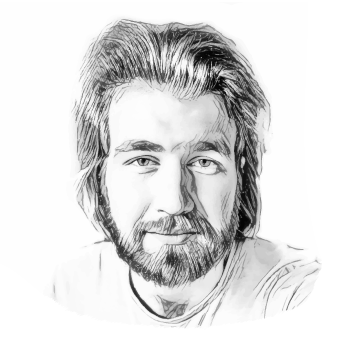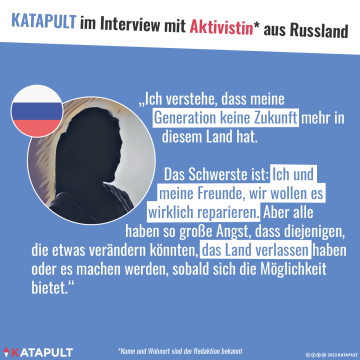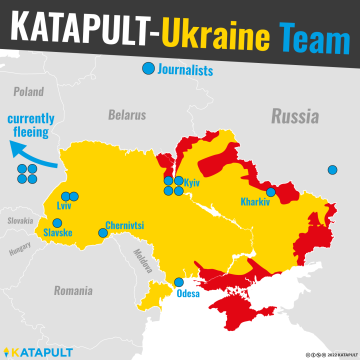Share article
The “Harkis” were described as poor devils by their officers. Often only rudimentarily equipped, these Algerians fought for the side of the French colonial forces in their own country during the Algerian War of Independence. The conflict lasted for more than seven years, until the North-African state finally managed to break away from foreign rule in 1962, by which point, hundreds of thousands of people had already been killed. The Harkis' reasons for fighting for the French were many and varied. Some did it for political reasons, while others were simply concerned with feeding their families. Some even claimed to have been forced into service.
As Algerian independence drew near, the Harkis faced the revenge of the Algerian nationalists. Branded as collaborators, they were publicly humiliated and mistreated. No fewer than 10,000 of them were put to death. French diplomats did not dwell long on the fate of the Harkis during the negotiations for independence. Some officers, however, did try to protect loyal Harkis and bring them to safety in France, but they were warned by the government that anyone who did not follow official immigration channels would be sent back to Algeria.
The tens of thousands of Harkis and their relatives were part of a larger migration of peoples: When the European colonial empires collapsed, millions of settlers, civil servants and their respective families left the affected countries, contributing to Europe's transformation from an emigrant continent into an immigrant continent. Between five and seven million people resettled in Italy, Spain, Belgium, Portugal, France, Great Britain and the Netherlands starting in about 1940. Their "return" posed major challenges for the mother countries and fundamentally changed some European societies.
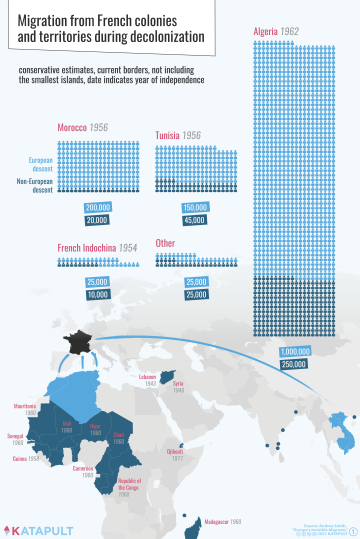
Among these migrants were at least 2.1 million people of non-European origin - some of whom left for economic reasons, others, like the Harkis, had worked for colonial authorities and feared retribution. Portugal serves as a good illustration of the scale of the situation: About half a million people emigrated from the former colonies to the country that was, at that time, considered to be the poorhouse of Europe. Between 1974 and 1979, the population grew by about nine percent, with most new immigrants coming from Angola and Mozambique. With the end of colonialism, multi-ethnic empires transformed into ethnically homogeneous nation-states. This often affected the way "decolonization migrants" were treated. If they were of non-European origin, they were often considered second-class citizens – even if they had been European citizens in the colonies for decades.
France was impacted perhaps more strongly than any other country by this migration wave. From Algeria alone, some 1.25 million people flooded into the country, no longer seeing a future for themselves in the former colony. Among them were 110,000 Algerian Jews. In the Paris region, the Jewish community grew by about 60 percent due to the influx of migrants.
Although the approximately one million French settlers in Algeria made up only a small part of the population, they had dominated the country with a harsh policy of discrimination against the Algerian majority. For many years, a sign on the beach in Algiers read: "Dogs and Arabs not permitted".
As a result, the settlers feared the retaliation of the Algerian nationalists and fled across the Mediterranean. Yet many of these "French" settlers had never been to France and actually had Spanish or Italian roots. Most initially moved to Marseille, where chaos reigned: the hundreds of thousands of new arrivals had overwhelmed the port metropolis. The cost of living rose, and accommodation became increasingly difficult to find.

Many French considered the appearance, accent and behavior of their "white" compatriots from Algeria to be alien. In the vernacular, they were nicknamed pieds-noirs, "black feet". The usual accusations that majority societies formulate against migrants, such as increasing criminality or rising rents, were quickly voiced against the pieds-noirs. Living in a constant state of social rejection, the pieds-noirs met in public places among their peers - and their desire to integrate was promptly called into question by the majority. Physical fights between the newcomers and residents of Marseille occurred frequently.
Furthermore, the former settlers were seen as a security risk. In 1958, right-wing pieds-noirs and military officers had initiated a coup d'état in Algiers; as a result, General Charles de Gaulle became the new president of France. And in 1961, right-wing generals and settlers in the colony had founded the terrorist organization, OAS, which continued to oppose Algerian independence even after the end of the war. In the same year, there was yet another attempted coup.
Among the French settlers, the OAS had enjoyed considerable support, at least initially, but this eroded as the violence escalated. Many French people in the metropolis suspected the newcomers of being sympathizers of fascist terrorism. Moreover, many were convinced that the selfishness and short-sightedness of the settlers had been the cause of the colonial war in the first place, which had resulted in a tremendous loss of life. The communists, still an important political force at the time, were also hostile to the pieds-noirs because they perceived them as a threat to the jobs of other Frenchmen.

At first, the government in Paris tried to convince the settlers to stay in Algeria. When it became obvious that this was not working, more than 300 laws were passed between 1962 and 1970 alone to assist the migrants in France. The key elements: Obtaining housing, economic integration and financial aid. It was their hope that people would not be forced to take the first job that came along, but instead, would be able to find a job according to their abilities.
For the Harkis, these lofty integration goals were not met as planned. In July 1962, President de Gaulle decreed that the vast majority of Algerian Muslims would need to reapply for French citizenship before a court on French soil. The Harkis who made it to the court did regain their citizenship in most cases, although the proceedings were sometimes slow and drawn out.
Terms such as "citizen" and "returnee", which were used to describe the pieds-noirs, quickly disappeared from the Muslim immigrants’ official papers. Instead, the words had been replaced by "refugee" and "harki". The change turned out to be purely lexical: The Harkis were not granted official refugee status. Historian Todd Shepard asserts that de Gaulle pursued a policy of racist exclusion.
While the pieds-noirs were portrayed by the government as part of the national community, the Muslims were portrayed as outsiders who were only supported out of charity, despite having been French citizens during colonial rule and had even having fought for France.
Those who were lucky found their own living space with the help of charitable soldiers or organizations. Those who were dependent on the state, however, had little chance of integration: These Harkis and their families were initially housed in former military camps in isolated rural regions, lacking electricity and running water for a time. Due to overcrowding, diseases such as tuberculosis spread. The inhabitants were constantly under the supervision of soldiers and were not allowed to move around freely. One of these camps, Camp de Rivesaltes, was previously used as an internment camp for Jews during World War II, before their subsequent deportation to the East. Other Harkis were sent to 72 remote forest settlements in the south of France, also guarded by the military, to work for the national forestry association. Nearly a decade and a half after the end of the war, 5,275 Harkis still lived in these settlements. Others moved to the outskirts of the cities in search of work. There, they often lived in deplorable conditions with other immigrants from North Africa in slum-like iron shack settlements.
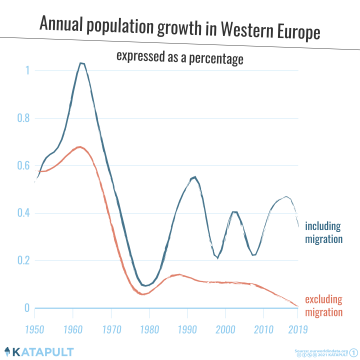
For years, many of these former soldiers had little contact with other non-Muslim French people. This physical separation reinforced their sense of exclusion. On the fringes of the cities, they faced both racism from the rest of the French and stigmatization as "traitors" by Algerian immigrants. The privileges that came with their citizenship also created envy and mistrust. Until the 1990s, many families lived in the poorest conditions, which continues to affect the opportunities of their sons and daughters today. Identity as a Harki descendant still plays a major role for many people, three or even four generations after their ancestors' immigration. For others, the significance of their own origins dwindled. They were absorbed into French society - typically, however, not into bourgeois or affluent groups, but rather into the poorer side of the socioeconomic spectrum.
Harkis and Algerian French people had to fight for their place in French society. Many pieds-noirs used organizational networks to better represent their interests, and thus, managed to gain some political influence. With their support, the conservative, Jacques Chirac, won the 1986 elections, for which they were rewarded a year later with a law compensating them for lost property in Algeria. The pieds-noirs have also disproportionately supported the far-right party, Front National (FN), which became a political home for many who were frustrated with the loss of French Algeria. Closely linked to this frustration was the FN's hostile attitude toward Arab-Muslim immigrants.
Among the Harkis, it was the children, often raised in the isolated camps and settlements, who were no longer willing to accept these living conditions. In the 1970s, they protested against the military-like administration of the camps. In the following years, they organized protest marches and hunger strikes in public places, set up roadblocks and set tires on fire to gain media attention.
For many years, the Harkis were considered les oubliés de l'histoire - "the forgotten of history". France remained silent about the Algerian war and all of the trauma it caused. It took until the late 1980s for the government to begin to include the Harkis in the country's official history, and even these attempts appear more symbolic in nature than sincere. In 1991, Harki descendants protested again, expressing their displeasure at the silence and marginalization they were still experiencing. Violent clashes with the police ensued. In subsequent years, Harki advocacy groups filed numerous lawsuits against the French government and used the courts as a political and media forum. In 1994, in response to the unrest, the government passed a law expressing the nation's gratitude for the service of the Harkis - something many Harkis and their descendants had desired for years. Despite this victory, the Harki community today is still waiting for France to acknowledge its responsibility in leaving so many of them to die following Algerian independence in 1962.

Aktuelle Ausgabe
KATAPULT ist gemeinnützig und unabhängig. Wir finanzieren uns durch Spenden und Abonnements. Unterstützen Sie unsere Arbeit und abonnieren Sie das gedruckte Magazin für nur 19,90 Euro im Jahr.
Authors
Jan-Niklas Kniewel
KATAPULT
Translators
Geboren 1994 in den USA. Seit 2020 Redakteur bei KATAPULT. Zuvor Studium der Musik und Linguistik/Germanistik an der University of Alabama. Teamleiter von @katapultmaps.

